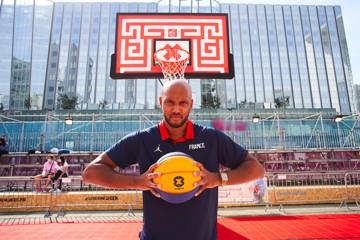We have found contents for ""
Sorry, we didn't find any results. Please ask another question.
Cette recherche n'a pas pu être traitée en raison d'un trop grand nombre de tentatives en peu de temps. Veuillez réessayer plus tard.
sur


“Do our utmost to be in Paris in 2024…” Interview with the head coach of the French 3×3 basketball teams
Tuesday, 21 june 2022
The FIBA 3×3 World Cup will be held in Antwerp (Belgium) from June 21 to 26. Karim Souchu, head coach of the French men’s and women’s teams, took this opportunity to share his thoughts about his sport and his objectives two years before the Olympic Games Paris 2024.
First of all, could you clarify your rather unusual status of being the head coach of both the men’s and women’s teams and in charge, more specifically, of coaching the men’s team. Can you explain this management system?
It is an organization specific to 3×3 basketball. It derives from the fact that all the competitions in our discipline combine both the men’s and the women’s tournaments. Until the Tokyo Olympics, the head coach trained both teams. From now on, for greater clarity, I coach the men’s team and Yann Julien coaches the women. It makes it easier for us to focus on each specific group during the competitions… But it also enables us to have the same identity and shared values even if, technically or tactically, we don’t ask both groups to do the same things. But we share a common spirit, the same vision of 3×3 basketball with the men’s and women’s teams… And, in my capacity as head coach, I’m responsible for ensuring the success of our project.
The special thing about 3×3 basketball is that coaches are forbidden from intervening during the matches…
It’s true that you can’t do any coaching during the match. That’s why the training, debriefing and remediation phases are essential. Our ability to win matches depends on this process, and the more we develop our expertise, the more the players will translate their instructions into their performance on the court….
Let’s come back to Tokyo, which was disappointing owing to the fact that the men failed to qualify and the women just missed their place on the podium…
It was already extremely important for the women to take part in this first Olympic 3×3 tournament… They were eliminated in the semi-finals because of a penalty… It is true that the men failed to qualify, but they came very close. When competing in the Olympic qualification tournament, they lost by just a few points to Latvia, the future Olympic champions.
It was the first time that 3×3 basketball was included in the Olympic program. How did it go?
It was an extremely positive experience. 3×3 basketball was one of the most popular disciplines, especially in the area of team sports. The discipline’s dynamic format was very popular.
What conclusions have you drawn from all this?
For the men, there’s an urgent need for greater professionalization in the run-up to Paris 2024 because our opponents, the teams from Eastern Europe in particular, are all professionals. We’ll have to improve our game if we’re going to compete with them. For the women, the team is focused on continuity while simultaneously integrating younger players and preserving a form of experience. In any case, both teams are now in a new cycle in the run-up to Paris 2024…
The World Cup is starting… How did the preparations go?
The men played a tournament in Belgrade to measure themselves against the Eastern European nations. They then competed in the International Tournament in Voiron in France, so we’ve played a whole series of matches. It was all very interesting. The women competed in the Women series in Tel Aviv, followed by the Tournament in Voiron… It also gave us an opportunity to discover the teams we’ll be facing in the World Cup.
In your capacity as a coach, your problem is to integrate 5×5 basketball players into your team, with the need to rapidly transform them into 3×3 players…
Yes, this is what makes our work so complicated because we’re frequently pressed for time. And the approach to 5×5 basketball is very different from the approach used in 3×3 basketball. It’s like 7-a-side and 15-a-side rugby; they’re two different disciplines. But the idea, as we prepare for Paris 2024, is to have players exclusively dedicated to 3-a-side basketball.
How is the qualification process for Paris 2024 going? You haven’t received any guaranteed places?
No, only one team out of the two will qualify directly, and that will be the best-placed team in the world ranking. Currently, it’s the women who have the highest ranking. You can also qualify directly if you’re one of the world’s top two teams or one of the top two teams in Europe; otherwise you have to go through the Olympic qualification process.
The event in Paris will be held at the Trocadéro: it should be one of the highlights of the Games Paris 2024. That puts you under a lot of pressure… Is it absolutely necessary to be there?
We’ll do our utmost to be present… And this World Cup is a major step in that direction.
Personally, you played in the national French basketball team. Why did you switch to 3×3 basketball?
I discovered 3×3 basketball by chance at a competition where I’d been invited to play, and I was immediately hooked… because of the intensity of the game and dynamism of the format.
The Caisse d’Epargne, a partner of the French Basketball Federation (FFBB) since 2014, has also been partnering 3×3 basketball since 2019. To discover more about this increasingly popular sport and learn about Karim Souchu, visit the ‘Coaching experiences’ section of our website.
And to follow the FIBA 3X3 World Cup and keep abreast of the latest news about the French teams, go to @Esprit Basket Caisse d’Epargne
Photo Crédit : Tony Voisin / FFBB